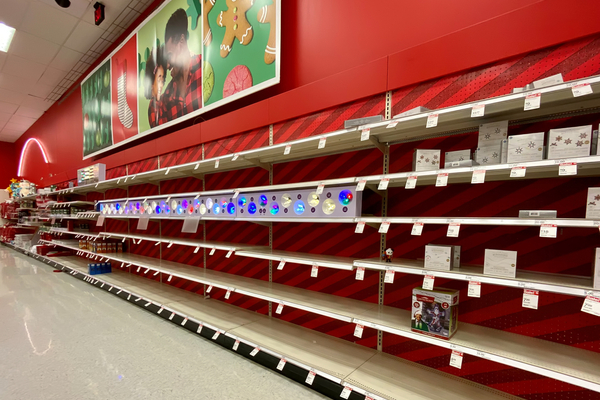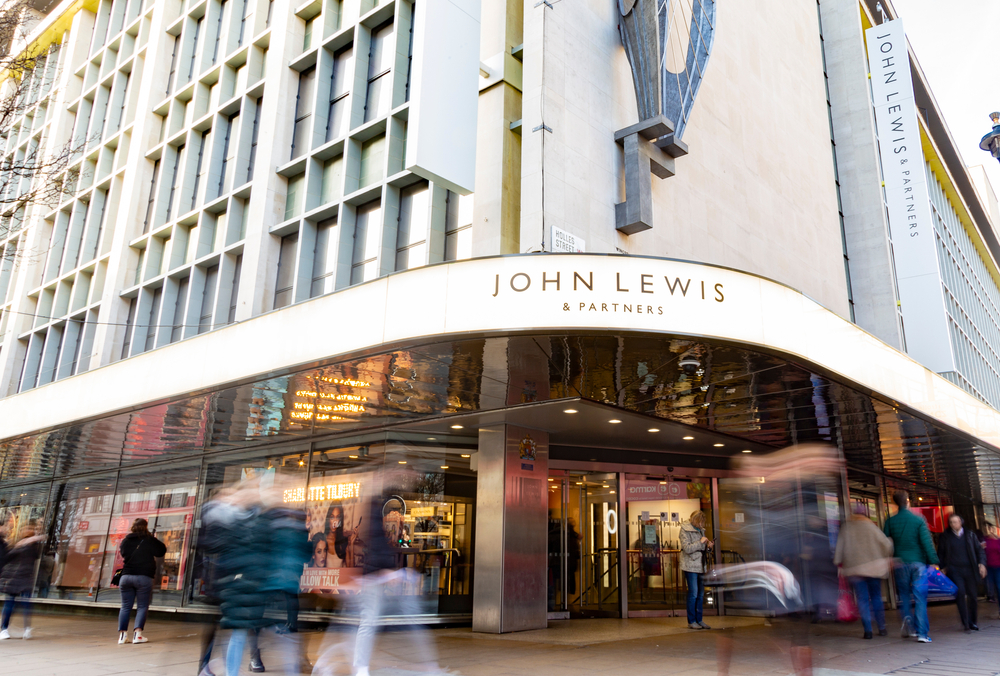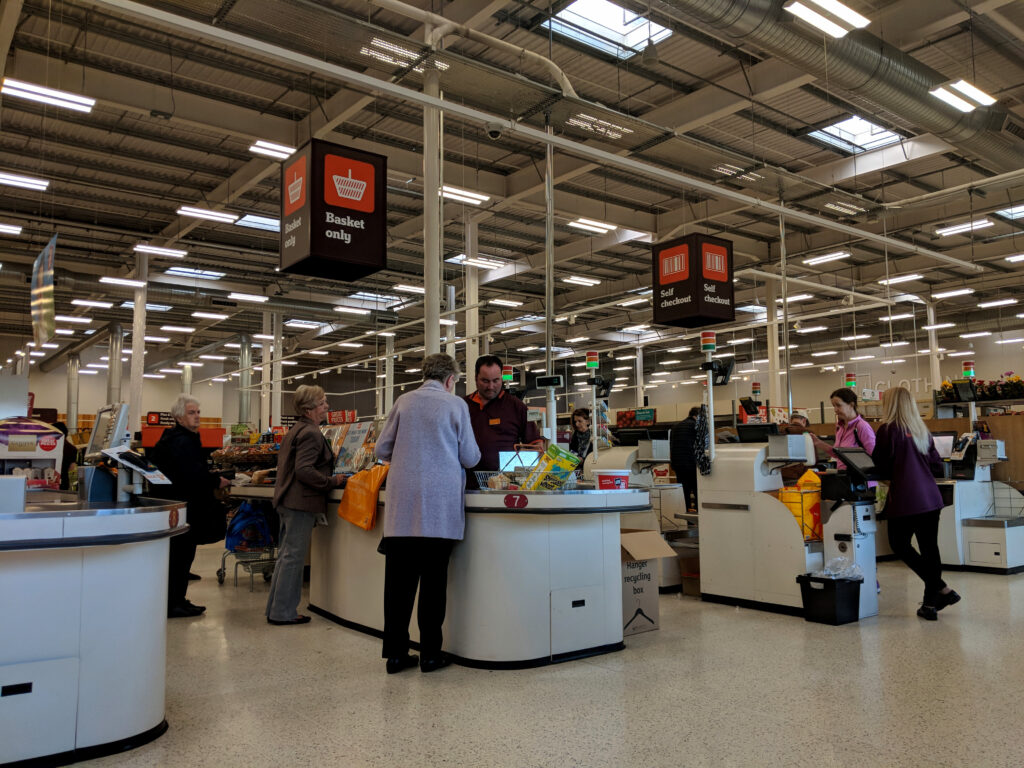With Brits scouring the country for petrol as the UK’s ongoing supply chain woes lead to panic buying, it might be starting to look like Christmas this year could be cancelled.
Just this month, Iceland boss Richard Walker urged customers not to panic buy ahead of Christmas saying that while he has concerns about supplies over the festive season, there was no need for consumers to stockpile and further affect supply chains.
He also warned that shoppers faced a significant increase in costs due to the national lorry driver shortage.
According to a recent survey from the Office for National Statistics the current supply chain crisis has left over one in six Brits unable to buy essential food items at some point during the past two weeks, while a quarter of respondents said they were unable to buy other non-essential food items.
Tesco’s chairman John Allan has mirrored what many industry experts have been saying – that the ongoing driver shortage will soon mean not only empty shelves but higher prices.
If Brits are struggling to get the food they need now, the upcoming festive shopping season will likely be an even bigger challenge.
Richard Parkinson, port director at Solent Gateway, the UK’s fastest growing port explained that lorries are so crucial to the supply chain because they cover the ‘last mile’ to the final customer.
“You can have the most efficient supply chains that use multi-model solutions and the latest data, but unless you can get the commodity onto a truck for that ‘last mile’ to the end user, the whole thing falls down,” he told Retail Gazette.
“There are very few solutions: rail gets you close but not to the end of the supply chain; ‘customer collect’ from the nearest node in the supply chain only works if the customer has the lorries to collect the goods.
“There are no real solutions – lorries are crucial for that last mile.”
In a bid to make sure shelves stay fully stocked throughout the run up to Christmas countless retailers have been offering incentives and payouts in a bid to attract new drivers.
Tesco has offered a £1000 joining bonus to lorry drivers who join the Big 4 grocer before the end of September, while Dixons Carphone is offering a £1,500 retention bonus to its lorry drivers and the same cash incentive to new recruits.
The question now is why now is there a lack of qualified HGV drivers within the UK, and have they just moved to a different sector?
Rob Shaw, Managing Director EMEA at the software comapny Fluent Commerce said in his opinion, there are possibly three main reasons for the wide felt shortages of drivers.
He cited the Covid-19 pandemic as a clear factor as haulage firms are having to operate within tighter margins to try to repair the economic impact caused by working restrictions and the increased cost base.
He added that the impact of Brexit and international workers deciding to leave UK shores has also left a significant gap.
“Lastly, even if pay incentives are offered, potential new drivers still have to invest significant monies up front to pass the necessary heavy goods vehicle licenses,” he explained.
While Michael Gove and his new cross-governmental committee attempt to rapidly increase the number of HGV drivers and work with food suppliers to solve the crisis in time for Christmas there are extra steps retailers can take to ensure their shelves stay full this festive season.
Parkinson said that retailers can try to secure contracts with haulage companies for minimum guaranteed access to HGVs, e.g. so many trucks per day at agreed prices.
However he warned that truck companies may be reluctant to commit to these now at set prices, as they will be able to charge increasing prices as retailers get more concerned towards Christmas.
“Alternatively they can build up stock but this drives storage costs into their supply chain (if they can get access to the additional storage capacity) and they have to watch the shelf life of products,” he added.
“Christmas products may also not yet be available this far before Christmas. So I would recommend a combination of additional stock where appropriate and trying to secure contracts that guarantee a level of HGV capacity.
“The other route is to own your own fleet of trucks. Many retailers have moved away from this as costs were lower for a contracted service, however I can see the shortage of available HGVs pushing retailers back towards their own fleets and drivers.
“The challenge then will be to pay their drivers enough so they are not poached by others.”

Many have branded the governments latest actions as too little to late, but Shaw believes there are other steps the they could have taken to avoid the crisis.
He said: “A task force often aims to tackle the immediate moment in time issue but it doesn’t address the main problem.
“It’s an HGV driver’s world at the moment”
“It’s been said that the Government is looking to incentivise international drivers to return to the UK.
“There are many (recently) unemployed or low paid citizens in the UK who would, I assume, welcome the opportunity to become well paid delivery drivers.”
He explained that the government could and should offer short term loans to enable HGV licenses to be obtained quickly and then repaid when employment is made, similar to the student loan model.
Nigel Lahiri, general manager EMEA at the automated warehouse fulfillment business GreyOrange said that since 2010 the Government has been actively championing supply chain digital transformation.
He stated that the events of the last 18 months have only acted to drastically ramp up the need for such transformation, with the UK’s current supply chain crises emphasizing the need for more digitalized and resilient supply chains throughout the country.
“The UK’s supply chain crisis has been driven by labour shortages which have been caused by both Brexit and the pandemic. While the pandemic would have been hard for the Government to predict, there is arguably more that it could have done to protect businesses from the impact of Brexit and the lack of European workers.
“One thing the Government could have done is supply brands and retailers with grants and loans to help them drive digital transformation initiatives.”
He said that this would not only instantly help ease the pressure on the supply chain issues that we see today, but that it will also help to build long-term resilience into the UK’s supply chain, meaning that future issues, such as labour shortages can be avoided.
In order for retailers to help minimise delays and shortages in the future, they should be looking towards innovation within technology and automation.
Managing Partner at the digital agency Foolproof, George Ioannou, said that by replacing legacy logistical systems for fleet solutions such as apps, retailers can manage logistics at scale in real-time.
“Investment in technologies to automate and streamline the supply chain such as AI and robotics (to name a few) will also help retailers to manage warehouses more effectively, meaning immediate demand is met and, using machine learning, forecast ahead of time,” Ioannou explained.
Lahiri was in agreeance and said that retailers should be looking to technology to help mitigate the risks of things like labour shortages.
“Retailers have had a hard time as it is over the last 18 months, and as we head into the busiest time of the year for the retail industry, they cannot afford to be running sub-optimal services, as this will have a negative impact on the consumer base,” he stressed.
Click here to sign up to Retail Gazette’s free daily email newsletter


















